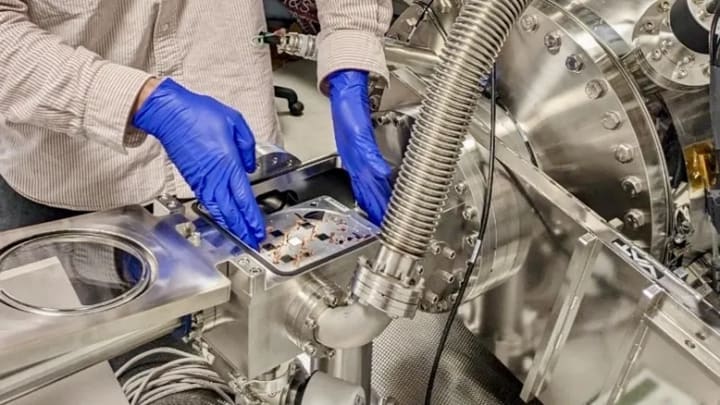"Breakthrough: 'World's Purest Silicon' Sets Stage for First Million-Qubit Quantum Computing Chips"
"Quantum Computing Milestone: Advancement in 'Purest Silicon' Paves the Way for Million-Qubit Chips"

Researchers have developed an advanced, ultra-refined variant of silicon, laying the groundwork for robust "silicon-spin qubits" that could fuel future quantum computers.
In classical computing, bits represent data as either 1 or 0. However, in quantum computers, qubits can exist in a superposition of these states, enabling them to maintain quantum coherence and simultaneously inhabit both 1 and 0 during computations.
These quantum machines hold the potential to surpass the capabilities of the world's fastest supercomputers. However, achieving this requires approximately a million qubits, according to the researchers. Presently, the most extensive quantum computer boasts around 1,000 qubits.
Quantum computing confronts a pivotal obstacle in the form of qubit noise—a phenomenon where qubits are exceedingly susceptible to interference, including temperature fluctuations. As a result, maintaining qubits at temperatures approaching absolute zero becomes imperative. Without such stringent conditions, qubits are predisposed to information loss and operational failures. This susceptibility to noise undermines the reliability and effectiveness of quantum computations, necessitating meticulous attention to environmental factors to mitigate interference. Consequently, advancements in cooling technologies and error-correction mechanisms are pivotal for enhancing the stability and performance of quantum computing systems. Efforts to mitigate qubit noise encompass a multidisciplinary approach, drawing upon expertise in materials science, quantum physics, and engineering to devise innovative solutions. The pursuit of fault-tolerant quantum computing hinges on minimizing the disruptive effects of noise, thereby unlocking the transformative potential of quantum technologies across various domains, from cryptography to drug discovery. Despite the formidable challenges posed by qubit noise, ongoing research endeavors hold promise for realizing robust and scalable quantum computing architectures capable of overcoming these obstacles.
Even with a quantum computer boasting millions of qubits, a significant portion would remain redundant despite the implementation of error-correction technologies. This redundancy would render the machine highly inefficient, as it would require substantial resources to maintain and operate. The challenge lies not only in scaling up the number of qubits but also in optimizing their utilization to ensure computational effectiveness. Addressing redundancy issues is crucial for harnessing the full potential of quantum computing and maximizing its efficiency. Therefore, research efforts are focused on developing techniques to mitigate redundancy and improve the overall performance of quantum computers. This endeavor is essential for realizing the transformative capabilities promised by quantum computing in various fields, from cryptography to drug discovery and optimization problems.
Unlocking the potential of silicon quantum computing offers the tantalizing prospect of revolutionizing our computational capabilities.
In a recent study featured in the journal Nature Communications Materials on May 7, researchers suggested a groundbreaking approach to qubit design. Traditionally, qubits rely on superconducting metals like tantalum and niobium due to their near-infinite conductivity and resistance. However, this study proposes a radical shift by advocating for the utilization of pure silicon, the standard semiconductor material in conventional computers. This innovative approach promises a qubit design that surpasses existing technologies in scalability. By leveraging the unique properties of silicon, this advancement holds potential for revolutionizing quantum computing, opening doors to unprecedented possibilities in.
Quantum computing might achieve a breakthrough with only a few hundred qubits rather than millions, thanks to a novel error-correction system.
QuEra, a quantum computing company, suggests that utilizing semiconducting materials like silicon, gallium, or germanium for building qubits offers several advantages over superconducting metal qubits. These materials boast relatively long coherence times, are cost-effective to produce, can function at higher temperatures, and are incredibly small—allowing for the potential of packing large numbers of qubits onto a single chip. However, the presence of impurities in semiconducting materials can lead to decoherence during computations, rendering them less reliable.
In a recent study, researchers proposed creating qubits from silicon-28 (Si-28), hailed as the "world's purest silicon" after removing impurities typically found in natural silicon. This approach aims to mitigate the risk of failure associated with impurities, potentially leading to more dependable qubits. Moreover, these silicon-based qubits could be manufactured at a scale as compact as a pinhead.

Ravi Acharya, a PhD student jointly affiliated with the University of Manchester and the University of Melbourne, is seen here in the P-NAME focused ion beam laboratory at the University of Manchester, preparing a silicon chip for enrichment. (Image credit: The University of Manchester)
Conventional silicon, found in nature, consists of three isotopes: Si-28, Si-29, and Si-30. While natural silicon serves effectively in traditional computing due to its metalloid characteristics, challenges arise when applied to quantum computing.
Of the isotopes present, Si-29, constituting 5% of natural silicon, poses a significant obstacle due to its propensity to induce a phenomenon known as "nuclear flip-flopping effect," leading to decoherence and information loss in quantum systems. Addressing this issue, researchers devised a novel technique to engineer silicon devoid of Si-29 and Si-30 atoms, thereby mitigating the detrimental effects and enhancing the potential of silicon in quantum computing applications.
Quantum computing becomes cheaper and more scalable.
Lead study author Richard Curry, who is a professor of advanced electronic materials at the University of Manchester, expressed, "What we've achieved is essentially crafting a fundamental 'building block' essential for assembling a silicon-based quantum computer. This accomplishment marks a pivotal milestone in rendering a technology with the potential to revolutionize humanity viable."
Scientists suggest that silicon-based quantum computers could be constructed using the same manufacturing techniques employed for classical electronic chips, enabling the integration of billions of transistors onto a minuscule circuit board. Although silicon qubits, or silicon-spin qubits, have been previously explored, the researchers emphasize advancements in silicon purity, evaluated through microscopy analysis.
Furthermore, silicon-based qubits hold promise due to their compatibility with existing chip fabrication methods, facilitating easier manufacturing compared to other qubit types. Consequently, quantum computers utilizing silicon qubits could potentially be scaled to the million-qubit range more rapidly than alternative approaches.
David Jamieson, project co-supervisor and professor of physics at the University of Melbourne, highlights the significance of producing extremely pure silicon-28. He underscores the next milestone: demonstrating the sustained quantum coherence of multiple qubits concurrently. Jamieson emphasizes that a dependable quantum computer with just 30 qubits could surpass the computational capabilities of contemporary supercomputers in specific applications.
About the Creator
Asaduzzaman .writer( poem,noble,story, kdp ebook)
Im a writer. I m writing to noble ,poem ,story , advanchar ,kidsbook.Im writing 10 years . Im sales noble ,poem , kidsebook . Im writer in Amazon.com kdp. see you my profile and contact me .






Comments
There are no comments for this story
Be the first to respond and start the conversation.